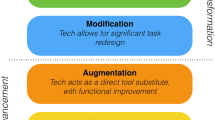Abstract
The introduction of technology education in primary and secondary schools during the past 10–15 years around the world has presented a number of difficulties for teachers, primarily related to their coming to understand the phenomenon of technology and to conceptualise the technology learning area in line with national frameworks. This paper reports on a professional development experience that aimed to assist a small group of primary school teachers to develop their understandings of technology and technology education. A theoretical model framed a series of professional development interactions between the researchers and the experienced teachers who were new to teaching technology. Data sources included teacher interviews, video recordings of the activities, teacher made models, and extracts from their reflective journals. The study presented some insights into how professional development experiences for teachers new to technology could be organised and implemented to best support their developing technology practices and understandings.
Similar content being viewed by others
References
Anning, A. (1994). Dilemmas and opportunities of a new curriculum: Design and technology with young children. International Journal of Technology and Design Education, 4, 155–177.
American Association for the Advancement of Science. (1993). Benchmarks for science literacy. New York: Oxford University Press
Australian Academy of Science. (1994). Primary investigations – teachers’ resource book 5. Canberra: Australian Academy of Science
Barnett, R. (1999). Realizing the university in an age of supercomplexity. Buckinghamshire: SRHE & OU
Barnett, R., & Hallam, S. (1999). Teaching for supercomplexity: A pedagogy for higher education. In P. Mortimore (Ed.), Understanding pedagogy and its impact on learning (pp. 137–154). London: Paul Chapman
Banks, F., & Barlex, D. (1999). No One forgets a good teacher! – what do ‘good’ technology teachers know? Journal of Design and Technology Education, 4(3), 223–229.
Banks, F., Barlex, D., Jarvinen, E-M., O’Sullivan, G., Owen-Jackson, G., & Rutland, M. (2004). DEPTH – Developing professional thinking for technology teachers: An international study. International Journal of Technology and Design Education, 14, 141–157.
Butler, J. (1996). Professional development: Practice as text, reflection as process, and self as locus. Australian Journal of Education, 40(3), 265–283.
Cochran-Smith, M., & Lytle, S. L. (1999). Relationships of knowledge and practice: Teacher learning in communities. Review of Research in Education, 24, 249–305.
Curriculum Corporation. (1994). A statement on technology for Australian schools. Carlton, Victoria: Curriculum Corporation
Education Queensland. (2000). New basics project technical paper. Retrieved 6 January, 2005, from http://education.qld.gov.au/corporate/newbasics/docs/nbftech.doc
Erickson, F. (1998). Qualitative research methods for science education. In B. J. Fraser, & K. G. Tobin (Eds.), International handbook of science education (pp. 1155–1173). Dordrecht, The Netherlands: Kluwer Academic Publishing
Fishman, B. J., Marx, R. W., Best, S., & Tal, R. T. (2003). Linking teacher and student learning to improve professional development in systemic reform. Teaching and Teacher Education, 19(6), 643–658.
Goodrum, D., Hackling, M., & Rennie, L. (2001). The status and quality of teaching and learning of science in Australian schools. Canberra, Australia: Department of Education Training and Youth Affairs (DETYA)
Guba, E. G., & Lincoln, Y. S. (1989). Fourth generation evaluation. Newbury Park: Sage
International Technology Education Association (ITEA). (2000). Standards for technological literacy: Content for the study of technology. Reston, VA: ITEA
Jarvis, T., & Rennie, L. J. (1996). Perceptions about technology held by primary teachers in England. Research in Science and Technological Education, 14(1), 43–54.
Jones, A., Mather, V., & Carr, M. (1995). Issues in the practice of technology education. Hamilton, NZ: Centre for Science, Mathematics and Technology Education Research, University of Waikato
Jones, A., & Moreland, J. (2004). Enhancing practicing primary school teachers’ pedagogical content knowledge. International Journal of Technology and Design Education, 14, 121–140.
Lincoln, Y. S., & Guba, E. G. (2000). Paradigmatic controversies, contradictions, and emerging confluences. In N. K. Denzin, & Y. S. Lincoln (Eds.), Handbook of qualitative research (2nd ed.) (pp. 163–188). Thousand Oaks, CA: Sage
Mittell, I., & Penny, A. (1997). Teacher perceptions of design and technology: A study of disjunction between policy and practice. International Journal of Technology and Design Education, 7, 279–293.
O’Brien, M. (2002). New pedagogies in the knowledge society: Teaching for deep learning, conceptual understanding and generative thinking. Paper presented at the 30th annual conference of the Australian teacher education association (ATEA), Brisbane, Australia, July
Queensland Studies Authority (QSA). (2003). Technology: Years 1–10 syllabus. Brisbane: The State of Queensland
Rennie, L. J., & Jarvis, T. (1994). Helping children understand technology. Adelaide: Department of Education and Children’s Services
Schön, D. (1987). Educating the reflective practitioner. San Francisco: Jossey-Bass
Shulman, L. S. (1986). Those who understand: Knowledge growth in teaching. Educational Researcher, 15(2), 4–14.
Stein, S. J., McRobbie, C. J., & Ginns, I. (2000). A model for the professional development of teachers in design and technology (ste99273.htm ®). Paper presented at the Australian association for research in education (AARE) annual conference, Melbourne, November–December, 1999. Available at: http://www.aare.edu.au/indexpap.htm
Zubrowski, B. (2002). Integrating science into design technology projects: Using a standard model in the design process. Journal of Technology Education, 13(2), 48–67.
Author information
Authors and Affiliations
Corresponding author
Rights and permissions
About this article
Cite this article
Stein, S.J., Ginns, I.S. & McDonald, C.V. Teachers learning about technology and technology education: Insights from a professional development experience. Int J Technol Des Educ 17, 179–195 (2007). https://doi.org/10.1007/s10798-006-0008-8
Received:
Accepted:
Published:
Issue Date:
DOI: https://doi.org/10.1007/s10798-006-0008-8




